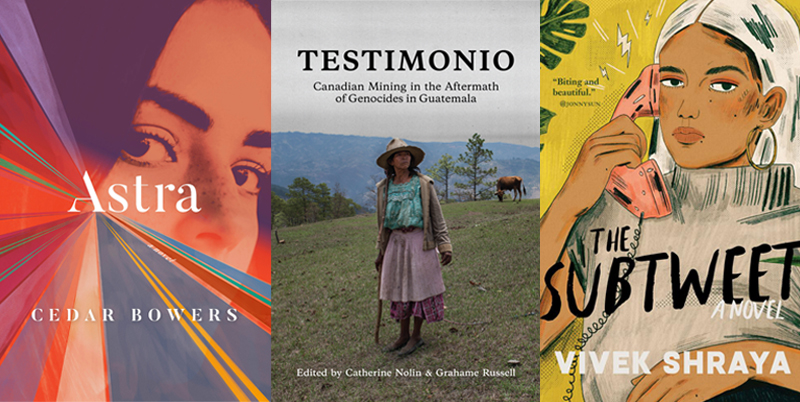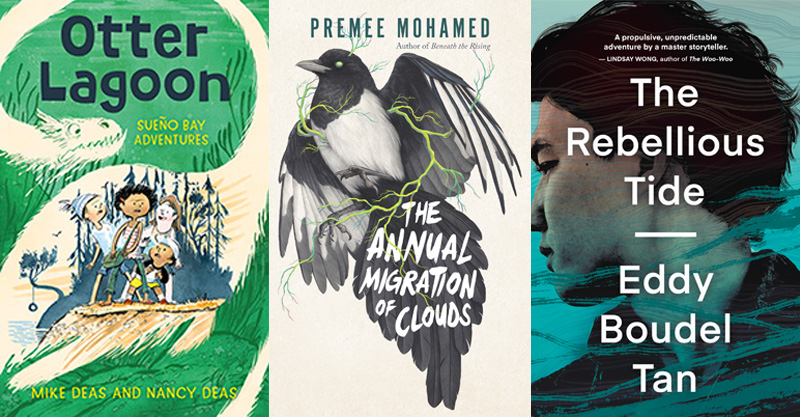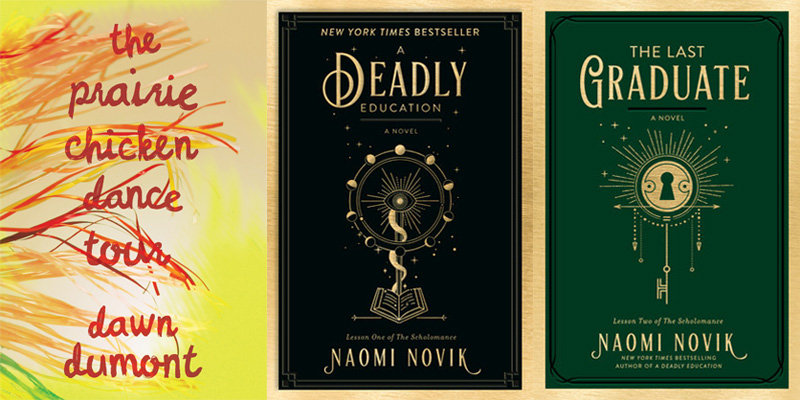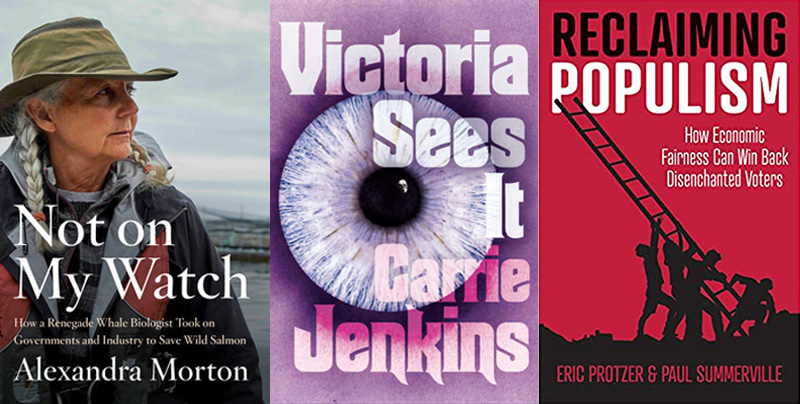Well, 2021 sure has been something. Between the flooding and landslides and fires, not to mention the exhausting discourse surrounding pickup trucks and bicycles — all during a pandemic! — you’d be forgiven if thoughtful presents were the last thing on your mind.
In fact, we’d go so far as to grant everyone a pass this year: no presents necessary.
But maybe you’re looking to curl up with a good book, or buy a book for a loved one, all while supporting an industry that, like many, has had its shares of ups and downs during COVID.
If so, the Tyee team has some recommendations — books we’ve loved for their incisive commentary, their fictional perspective on the very real issues facing us today, or simply for their welcome escapism.

For back-to-the-landers (and anyone fascinated by back-to-the-landers!):
Astra
By Cedar Bowers
(McClelland & Stewart)
“That’s what it was like at Celestial back then: everyone was responsible for everyone else, while nobody knew how to be responsible at all.” Astra grew up on a haphazard commune in B.C. with her neglectful, reluctant single father, a handful of moderately ominous men, and a couple come-and-go women. The novel is populated with the smaller tragedies and traumas and missteps and triumphs that can happen when adults involve kids in their well-meaning but perhaps misguided attempts to save the world. Astra’s structure allows the novel to plumb what kindness, and love, and neglect, and friendship and family mean in these circumstances — what can be so certain in one light, and then completely overturned in another.
For your friend’s disaster capitalism library:
Testimonio: Canadian Mining in the Aftermath of Genocides in Guatemala
Edited by Catherine Nolin and Grahame Russell
(Between the Lines)
Decades of repression and genocide backed by the United States may have been horrible for Indigenous people in Guatemala, but it’s turning out to be quite profitable for Canadian mining companies and their investors. Edited by a pair of University of Northern British Columbia professors, Testimonio brings together first-hand accounts, journalism and scholarship to detail the damaging social impact of mining in Guatemala. Like in many other countries, that exploitation now tends to come with a Canadian face and the full support of the Canadian government. Spiked by a major European academic publisher before a smaller Canadian publisher picked it up, the book’s a testimony to the value of persistence and bearing witness.
For the intellectual hunter and gatherer in your life:
The Dawn of Everything: A New History of Humanity
By David Graeber and David Wengrow
(Farrar, Straus & Giroux)
This book is plain fun — an intellectual romp through 200,000 years of human history that overturns all the conventional wisdom about our ancestors. And it offers encouraging new directions for social change. This collaboration by an anthropologist with anarchist politics (Graeber) and an archeologist (Wengrow) is full of surprising and fascinating information about the societies of the past, especially since the end of the Ice Age about 12,000 years ago. A lot will surprise you as the book argues against the proposition that the human experiment just drifted along until we settled down on farms and got busy with civilization.
For your friend who is maybe a little too online:
The Subtweet
By Vivek Shraya
(ECW Press)
Vivek Shraya’s novel details the rise and fall of a friendship between two Toronto-based musicians, both aided and destroyed by Twitter and YouTube as the characters navigate each platform in its early years. The original songs featured in the book, composed and performed by the multi-talented Shraya, perfectly soundtrack an exploration of the beauty and vulnerability artistic collaboration breeds. If you are missing the halls of live music, this book comes at the perfect time to transport you there from your quarantine couch.

For kids coming to grips with the climate crisis:
Otter Lagoon
By Mike and Nancy Deas
(Orca Books)
This graphic novel for six- to eight-year-olds is great. Set in Sueño Bay, Otter Lagoon stars Jenna, her younger brother Sleeves, and their friends Ollie and Kay, who are working to uncover the mystery of Otter Lagoon’s sea monster. The sea monster, referred to as Ol’ Luna, makes a rare appearance every 100 years following a series of supernatural events. When Jenna becomes desperate to raise money to solve a problem caused by a moment of carelessness, she seeks out a shady exchange with local child thief Jayden Mathers, to sell him glowing objects she finds in Otter Lagoon. Ashamed by her dealings with Mathers, Jenna must find a way to reconcile with past mistakes, debunk “half-credible sightings” and respect the wildlife around her. Whether they’re a disbeliever like Ollie, an imaginative child like Sleeves, or a flawed heroine like Jenna, there’s at least one character every child will identify with.
For fans of 'On Such a Full Sea' and 'Oryx & Crake':
The Annual Migration of Clouds
By Preemee Mohamed
(ECW Press)
This tale begins with a choice: Reid, who lives in post-climate-apocalypse Alberta with her single mother, has to decide whether she’s going to accept a rare and hard-earned offer to go to university. Reid and her mother are both carriers of Cad, a strange fungi that has infected lots of, but not all, Albertans; if Reid leaves, she won’t be able to help her mother out if she gets sicker. She’d also be leaving a community that has banded together to survive in a world of floods, droughts and fires. At around 160 pages, the book earns a depth of character and world-building usually enjoyed by doorstopper fantasy tomes. Mohamed’s prose is gorgeous and lush.
For your friend who is feverishly fascinated by pandemics:
New Pandemics, Old Politics: Two Hundred Years of War on Disease and Its Alternatives
By Alex de Waal
(Polity Books)
The author’s thesis is as distilled as it is sweeping. The world system we have built over two centuries of imperial conquest and rule is itself the generator of pandemics; the pandemics emerge from our politics and economics, and we respond to them politically — not medically. He knocks down common myths one by one, including that plagues are just bad luck, that pandemics don’t play favourites, and that hospitals are the key line of defence against outbreaks. Our Crawford Kilian was so taken with this book he wrote a long essay keying off it.
For folks who aren’t vaccine hesitant, but have a hard time believing all those briefings:
Spin Doctors: How Media and Politicians Misdiagnosed the COVID-19 Pandemic
By Nora Loreto
(Fernwood)
The latest book by journalist, activist and author Nora Loreto is a provocative recounting of the last two years, mapping a meticulous timeline of the COVID-19 pandemic. Sound messy and overwhelming? It isn’t — the Take Back the Fight author says the book basically wrote itself: from chapters “Disaster in Residential Care” to “COVID-19 Hits Food Processing Industries” to “The Race for the Vaccine,” Loreto uses both hot-topic and under-told pandemic issues to illustrate how leaders, profiters and the public responded to the emergency. The common and enraging thread throughout is how media misdiagnosed accountability for all of the lives lost.
For fans of the reality TV show 'Below Deck' who also enjoy a good literary novel:
The Rebellious Tide
By Eddy Boudel Tan
(Dundurn)
Here is a cinematic, queer page-turner by 2021 Writers’ Trust Rising Star Eddy Boudel Tan. After his mother dies, Sebastien Goh sets out on a journey to find the father he’s never met. The book is split in part between current-day events — which unfold on a luxury liner in the Mediterranean, and flashbacks to Sebastien’s life growing up as the mixed-race kid of a single mother in small-town Quebec. This is equal parts an exploration of familial and romantic relationships and the simmering rage of injustice, with an explosive secret at its centre.

For those who can — and those who can’t — dance:
The Prairie Chicken Dance Tour
By Dawn Dumont
(Freehand Books)
“‘It’s only 15 days,’ he reminded himself. Then he’d be home and he’d have the rest of his life to watch over the horses and kill his older brother.” The Prairie Chicken Dance Tour is written in third person, cleaving close to its characters, including John Greyeyes, a rancher and former traditional Chicken dancer whose brother is the Chief of the Fineday reserve. This simultaneous closeness and distance is the perfect narrative tool for Dumont’s dry, funny style. The basic premise of the book is that Greyeyes’ brother has organized a 15-day European tour for the reserve’s Prairie Chicken dance troupe. But then everyone gets food poisoning, and Greyeyes, who hasn’t danced in years, is roped into leading a misfit gang of replacement dancers. Serious, sad and amusing, propelled by skillful dialogue.
For the middle-aged mom who needs escapist self-care. Or the teenager who’s outgrown Harry Potter:
A Deadly Education and The Last Graduate
By Naomi Novik
(Del Rey)
Whatever your age, perhaps the tribulations of 2021 are sending you back into the comforting embrace of the fantasy novel. Trolls? Elves? Magic? Bring it on! In this tightly wound tale told in two books, main character El (short for Galadriel) wrestles with her own dangerous powers, a case of raging misanthropy and a tendency to overthink other people’s motivations, all while battling monsters that have infested a very dangerous school for wizards. And the choice at the heart of this story — between self-preservation or risking it all to save future generations — could not feel more timely.
For the settler who could use a bit of unsettling:
Indian in the Cabinet: Speaking Truth to Power
By Jody Wilson-Raybould
(HarperCollins)
Don’t expect a he-said-she-said soap opera, including the naughty bits where Justin Trudeau behaves badly (or where the author does). Instead, Wilson-Raybould provides brilliant political anthropology, a unique perspective on the Canadian political system and its fatal failings. We see Ottawa’s machinery viewed from the inside by Canada’s first Indigenous attorney general, who grew up living in another system and educated for leadership in that system just as Justin Trudeau and his father were educated in theirs. What a gift, and a challenge, Wilson-Raybould provides.
For your friend who keeps replying to get rich quick emails from foreign lands:
Don’t Call It a Cult: The Shocking Story of Keith Raniere and the Women of NXIVM
By Sarah Berman
(Penguin Random House)
What hold did Keith Raniere exert over his NXIVM cult (yes it was a cult) and what lessons lie in the bizarre episode? Former Tyee reporter and editor Sarah Berman’s riveting bestseller unravels decades of manipulation, abuse and sexual exploitation directed by Raniere and facilitated by his wealthy and powerful supporters. Don’t Call It a Cult is a deeply researched and empathetic examination of the vulnerabilities and motivations that lead people to believe what they desperately want to be true, and the social dynamics that push them to cross unthinkable lines.

For the renter who fantasizes about unconventional home ownership:
Small Structures of Nova Scotia: Spaces Of Solitude, Necessity and Simplicity
By Jessie Hannah
(Nimbus Publishing)
In pictures and stories, seeking out beauty in the practical, Jessie Hannah gives us access to over 30 small Nova Scotian dwellings ranging from a remote fishing shanty to a warm logger’s cabin and unique tiny homes. Growing up in a domed structure in rural Nova Scotia that her parents built after their house burned down, Hannah learned to appreciate the privilege of living in a house built for purpose rather than to convention. As an adult, she resided in a cozy laneway house in Vancouver. The author’s deep appreciation of small buildings and the freedom and function they bring to the dweller is what sets this book apart from publications purely focused on design. It brims with personal stories of each structure and the owner or builder, allowing readers to imagine themselves in each place, perhaps sipping tea.
For your friends who hate to shop and your friends who love to shop:
The Day the World Stops Shopping
By J.B. MacKinnon
(Penguin Random House Canada)
“For the sake of this thought experiment, I wanted to keep it simple: on the day the world stops shopping, global consumer spending drops by 25 per cent,” explains the author. In other words, we don’t really stop buying, but our rate of consumption drops dramatically. The richly reported result is a masterclass in global economics and the anthropology of consumer behaviour, a book stunning for both its complexity and its clarity. MacKinnon knows how to spark rethinks. He co-authored with Alisa Smith The 100-Mile Diet, a behavioural experiment that helped catalyze the local food movement, launched right here on The Tyee.

For the defender of all things wild:
Not on My Watch
By Alexandra Morton
(Penguin Random House Canada)
Slap on your rain slicker and clamber into Morton’s inflatable boat as she guides you through her life-long battle to raise awareness about the dangers farmed salmon pose on wild B.C. salmon. Part love story with wilderness, part science field book, Morton’s skilled storytelling will suck you in as she witnesses and documents the decline of a once boundless species. Morton tells of switching from marine researcher to activist as her warnings to industry and government go ignored (or even get covered up). Not on My Watch skims over stormy seas, delves into the dangers of colonial management of a resource and celebrates the future of Indigenous salmon stewardship. But it should come with a warning: you’ll never be able to look at farmed salmon the same way again.
For the difficult teen in your life:
My Summer of Love and Misfortune
By Lindsay Wong
(Simon and Schuster)
Wong’s 2019 debut memoir The Woo-Woo: How I Survived Ice Hockey, Drug Raids, Demons and My Crazy Chinese Family, is an unflinching recounting of familial trauma and mental illness that manages to also be incredibly funny. Last year she released a frothy, charmingly chaotic YA novel, My Summer of Love and Misfortune. Thankfully, nobody’s perfect in Wong’s written world. As she told The Tyee: “I feel like I’m a difficult person, too, and I like other complex, difficult people. I feel like I understand them. That’s why we read, right? To find people who are similar to us, and who say things that we would love to say in real life, even though we know we shouldn’t because we might get fired from our jobs.”
For your friend who needs inspiration to get off their ass:
Go Do Some Great Thing
By Crawford Kilian
(Harbour Publishing)
In 1858, 35 Black travellers arrived in what would be called British Columbia and liked what they found. The delegates would pave the way for many more Black emigrants from California, a racist state in a nation headed towards civil war over slavery. B.C.’s Black settler pioneers, many of whom were eager to participate in colonial politics as equals, did do great things despite facing new barriers. Kilian’s account, published in 1978, became a B.C. history classic and now it’s been re-edited and re-released by Harbour Publishing with an update.
For those looking for a slow, simmering literary thriller:
Victoria Sees It
By Carrie Jenkins
(Strange Light)
Victoria Sees It is an interior novel, revealing Victoria’s rich inner life and perspective on what’s happening around her. When she is born, her mother stops speaking and is institutionalized; Victoria goes on to live with her aunt, who cares for her, and her uncle, a realistic enough sort of villain. A bright kid, if weird, she eventually ends up on scholarship at an all-girls boarding school her family still can’t quite afford, and then she ends up at Cambridge, where she makes her first-ever real friend. All goes well — maybe for the first time in her life, socially — until Victoria’s friend vanishes. Complex and destabilizing, this book is a puzzle that begins in one place and ends up somewhere unexpected.
For your great uncle the draft dodger:
The Devil’s Trick: How Canada Fought the Vietnam War
By John Boyko
(Alfred A. Knopf Canada)
Historian John Boyko is a good researcher and an even better writer. He breaks his book into six chapters, each built around a person who typifies an aspect of Canadian involvement in Vietnam. Along the way some of the myths of Canada’s principled stand against America’s war fall away. Canada provided the Agent Orange defoliant the U.S. military used to poison Vietnam’s forests and was in no rush to accept refugees. But there are heroic resisters, too, in this needed reminder of the political asymmetry that afflicts our relations with our superpower to the south.
For the cousin who turned up last year in a MAGA hat and a yellow vest:
Reclaiming Populism: How Economic Fairness Can Win Back Disenchanted Voters
By Paul Summerville and Eric Protzer
(Polity Books)
Scheduled for release in January, Reclaiming Populism promises to examine the rise of populism in various countries and trace its roots to the failure to create societies where everyone has equal opportunities. When family origins matter more than talent and hard work, frustration and unrest rise up. To save democracy, the book argues, we must make the economy fair.
For your buddy who’s waiting for the revolution:
Capital and Ideology
By Thomas Piketty
(Belknap Press)
French economist Thomas Piketty previously exposed the great divides of neoliberal globalism. His latest effort uses French, British and American post-electoral surveys to argue that since the Second World War the expansion of education to include most of the middle class and much of the working class has resulted in the creation of the “brahmin left” — a new professional/administrative class that votes left against the wealthy “merchant right,” but is far from the working-class values of its roots. A stocking stuffer for your egghead pal who wonders why the hell progressive agendas meet so much populist distrust.
For anyone who is itching to hit the road:
Tales of BC: 50 Years of Wacky, Wild and Thought-Provoking Adventures
By Daniel Wood
(OP Media Group)
When highly decorated magazine writer Daniel Wood died earlier this year, he left a beautiful gift to the place he called home and its people — an anthology of British Columbia adventures he’d written over the course of five decades. His 28 pieces explore scientific discoveries, illicit industries and characters ranging from authentic cowboys to Elvis impersonators. As Wood said in March in a piece in The Tyee: “I’ve always had a Buddhistic approach to life, choosing to accept that consciousness is a blessing. If you want to live fully: You seize the day. You take risks. You embrace opportunities. You go to the edge.”
Contributors to this list include: andrea bennett, David Beers, Michelle Cyca, Crawford Kilian, Ian Gill, Moira Wyton, Jen St. Denis, Netanya Castillo, Em Cooper, Andrew MacLeod and Sarah Krichel. ![]()
Read more: Media















Tyee Commenting Guidelines
Comments that violate guidelines risk being deleted, and violations may result in a temporary or permanent user ban. Maintain the spirit of good conversation to stay in the discussion.
*Please note The Tyee is not a forum for spreading misinformation about COVID-19, denying its existence or minimizing its risk to public health.
Do:
Do not: